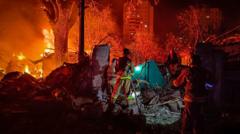Russia shows dismissive reactions to Trump's military posturing, indicating possible strategic calculations behind Moscow's silence.
**Trump's Nuclear Submarine Deployment: A Reaction to Medvedev's Provocation?**

**Trump's Nuclear Submarine Deployment: A Reaction to Medvedev's Provocation?**
In a surprising response to former Russian President Dmitry Medvedev's social media comments, Donald Trump moves nuclear submarines closer to Russia, raising questions about nuclear tension.
Former President Donald Trump's recent announcement of moving two nuclear submarines closer to Russia follows a series of provocative social media exchanges with Dmitry Medvedev, the former Russian leader. Trump's deployment raises eyebrows and questions about possible U.S.-Russia tensions, reminiscent of Cold War anxieties.
Medvedev’s comments, which suggested that Trump's ultimatum regarding Russia's war in Ukraine could escalate the situation, didn't seem to have the desired impact on Trump. Instead, his response was to escalate military readiness, leading some to wonder if this could trigger a new type of diplomatic confrontation akin to the Cuban Missile Crisis.
However, the initial reaction from Russian media outlets has been notably dismissive. Commentary from analysts indicates a belief that Trump’s announcement is mere bluster. A military expert from the Moskovsky Komsomolets newspaper criticized Trump’s decision as "a temper tantrum," while a retired lieutenant-general described his remarks about submarines as "meaningless blather."
Notably absent have been official responses from Russian authorities, suggesting they may either be deliberating on the next steps or perceiving no immediate threat from Trump’s actions. The Kremlin and other branches of the government have yet to issue statements on the matter, which might indicate a lack of urgency in response.
Interestingly, this is not Trump’s first instance of deploying military resources as a response to perceived threats. In 2017, he announced a similar naval deployment to the Korean peninsula before proceeding to diplomatic talks with North Korean leader Kim Jong Un. Observers are left to speculate whether the apparent military escalation with Russia might also play into Trump's larger strategy of unpredictable negotiations.
Trump insisted that his decision was a response to Medvedev’s references to nuclear capabilities, stating that such talk raises his alertness to potential threats. This insistence on readiness against nuclear mentions is becoming a hallmark of Trump’s rhetoric, despite critics claiming Medvedev’s comments echo a long history of nuclear saber-rattling from Russian officials.
As both leaders engage in this social media-driven back-and-forth, it is unclear whether the silence from Moscow signifies a strategic choice to disengage from escalating tensions or an opportunity for potential dialogue. The geopolitical implications remain significant, reflecting on the state of U.S.-Russia relations and the global standing of nuclear diplomacy in the 21st century.

















